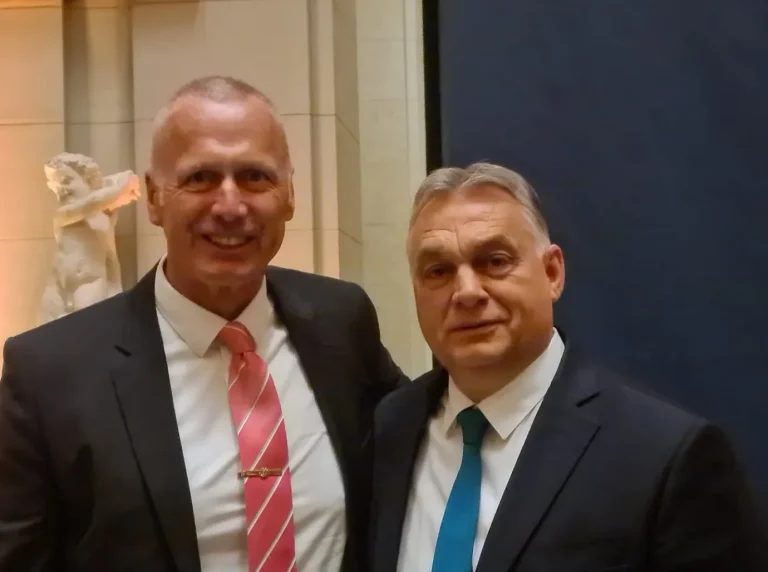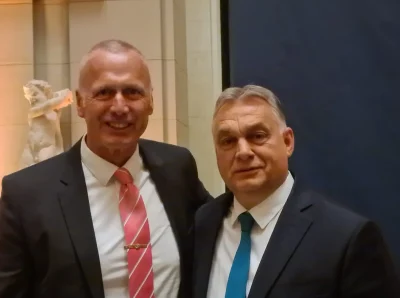Photo: Georg Spöttle's Facebook page 2025-06-12
Photo: Georg Spöttle's Facebook page 2025-06-12
A German-Hungarian pro-Orbán media figure who frequently appears in government-aligned outlets and once ran as a Fidesz candidate, Georg Spöttle, is now at the center of a national security controversy. One of his close acquaintances failed a security screening due to Spöttle’s ties to Russian intelligence. According to information obtained by Direkt36, Spöttle maintained a close relationship with a Russian military intelligence service officer.
In the second half of 2024, a person applying to become a diplomat failed their national security screening. The applicant had enrolled in the diplomatic training program of the Hungarian Diplomatic Academy, which operates under the Ministry of Foreign Affairs and Trade (KKM), hoping it would lead to a future diplomatic post. However, the screening process flagged a national security risk: one of the applicant’s close acquaintances—a prominent figure in the Hungarian government’s propaganda machinery—has ties to Russian intelligence services.
This raised serious concerns, as diplomats regularly gain access to sensitive internal government documents, including classified material. Even more troubling was the nature of the relationship: the propagandist was not just a close personal acquaintance but, according to sources familiar with the matter, had actively helped guide the applicant’s career and tried to secure them a diplomatic position using his own government connections.
The pro-Orbán propagandist with alleged Russian intelligence ties is a well-known public figure in Hungary: Georg Spöttle, a German-Hungarian who frequently appears in pro-government media as a self-styled “security policy expert.” For years, Spöttle has spread disinformation and Kremlin-aligned narratives across government-controlled media platforms—including Magyar Nemzet, Pesti Srácok, Origo, Mandiner, Hír TV, TV2, and Hungary’s state broadcaster.
Spöttle has also been a regular guest at the ruling Fidesz party’s campaign events, ran as a Fidesz candidate in the 2019 municipal elections in the city of Szentes, and, until a few years ago, worked as a migration expert for an institute of the Nézőpont Group, which has received government contracts worth tens of billions of forints. On his LinkedIn profile—last updated in summer 2023—he simply states that he works as a political analyst for the Hungarian government. He also claims to have served in the West German military and police force in his earlier German career.
What is not widely known in Hungary is that, in recent years, Georg Spöttle has also become a frequently cited figure in Russian-language Kremlin propaganda. At the same time, he developed personal and professional relationships with individuals working for Russian intelligence and gained access—under the organization of the Russian state—to locations in Russia that would typically require security clearance from Russian intelligence services.
Direkt36 uncovered details about Spöttle’s case through sources close to the government, personal acquaintances of Spöttle, former Hungarian intelligence officers, as well as from email correspondence and photographs obtained during the investigation.
The Prime Minister’s Cabinet Office sent a written response, but oddly, they misinterpreted our clear questions—as if we had asked about Spöttle’s own national security screening rather than that of the person applying to the diplomatic program. “No government body ordered any vetting of Georg Spöttle, and the national security services have not dealt with his screening in any such manner,” the Cabinet Office wrote.
After receiving this response, we followed up with a more detailed explanation of the case, explicitly naming the individual who failed the screening. We asked the Cabinet Office to respond accordingly. In a response sent after the article was published, they did not meaningfully answer the detailed questions; instead, they merely stated that “the contents of the article do not reflect reality,” according to the Cabinet Office.
We first contacted Georg Spöttle more than two and a half months ago with a set of written questions. Although he saw the message, he did not respond. We later sent him additional, even more detailed questions—but again, received no answer. However, shortly after we sent our first set of questions to Spöttle, the LinkedIn profile of his close acquaintance who had failed the screening became unavailable. The Ministry of Foreign Affairs and Trade (KKM) and the Constitution Protection Office (Hungary’s counterintelligence agency), also did not respond to our inquiries.
Spöttle was outraged
Under normal circumstances, the details of a national security screening—especially its outcome—are known only to a very limited circle. As such, cases of failure rarely become public knowledge. However, Georg Spöttle was so outraged that his close acquaintance had failed the screening that he tried to mobilize his political and governmental contacts at various levels to challenge the decision. Ironically, this effort ended up drawing wider attention to the case.
In the end, no one was willing to help Spöttle. Offended by this, the propagandist announced in early 2025 that he was retiring from public life. Yet just weeks later, he reversed course and resumed publishing regularly on various pro-government media platforms as well as on his personal social media accounts.
His primary focus has been the war in Ukraine. On the Pesti Srácok website, for instance, he hosts a show titled GEOrgPOLITIKA, where he regularly comments on war-related news. Internal correspondence obtained by Direkt36 suggests that Spöttle’s earlier Kremlin-friendly analyses closely mirrored briefing materials he received from a Russian military intelligence officer. One of Spöttle’s main contacts at the Russian Embassy in Budapest was military attaché Oleg Smirnov, who arranged for Spöttle to attend a Moscow conference in 2024 organized by the Russian Ministry of Defense. In emails related to the trip, Spöttle told Smirnov that he would publish articles and appear on Hungarian TV based on the impressions he gathered during the event.
After returning home, Spöttle ramped up his output even further—producing a flood of video and written content on the Russia–Ukraine war from a distinctly pro-Russian viewpoint. He even conducted an interview with Russian Foreign Ministry spokesperson Maria Zakharova, which aired on Pesti Srácok. He also regularly appeared on Ultrahang, a YouTube channel aligned with Hungary’s neo-protestant Faith Church congregation, and was featured on Hír TV, and boasted headlines such as “Georg Spöttle: Ukraine would even conscript transgender soldiers and teenagers.” He also provided commentary for prominent online and print government propaganda mouthpieces Origo and Magyar Nemzet.
The content Spöttle publishes on the war is fully aligned with Kremlin narratives, often emphasizing military strategy and weaponry. In some cases, his commentary goes beyond even the Hungarian government’s own pro-Russian messaging. For instance, in Magyar Nemzet, he claimed that a Rheinmetall arms factory in western Ukraine could pose a threat to both Transcarpathian Hungarians and Hungary itself, since it might become a target of Russian attacks. This position contradicts the Hungarian government’s stance, as Rheinmetall is a strategic partner not only of Hungary’s military but also of the government-linked tech company 4iG.
In an Ultrahang podcast appearance in fall 2022, Spöttle made his position crystal clear:
“I don’t hide my views. In this war, I fully support Russia.”
As for Oleg Smirnov, Spöttle’s embassy contact, this article’s author previously reported on VSquare that Smirnov was a GRU officer—an agent of Russian military intelligence. His presence in Hungary and connections with senior Hungarian defense officials raised eyebrows among NATO allies. Smirnov concluded his posting in Hungary in the fall of 2024.
“The Commando’s Soul”
“Working lunch with Minister Péter Szijjártó. We had plenty to discuss, from the Russia–Ukraine conflict to the Middle East…” — wrote Georg Spöttle in a since-deleted Facebook post on October 18, 2024, alongside photos from his meeting with the Hungarian foreign minister. Szijjártó also shared images from the meeting, captioned: “The world has become a very complicated place; we discussed how each of us sees it…”
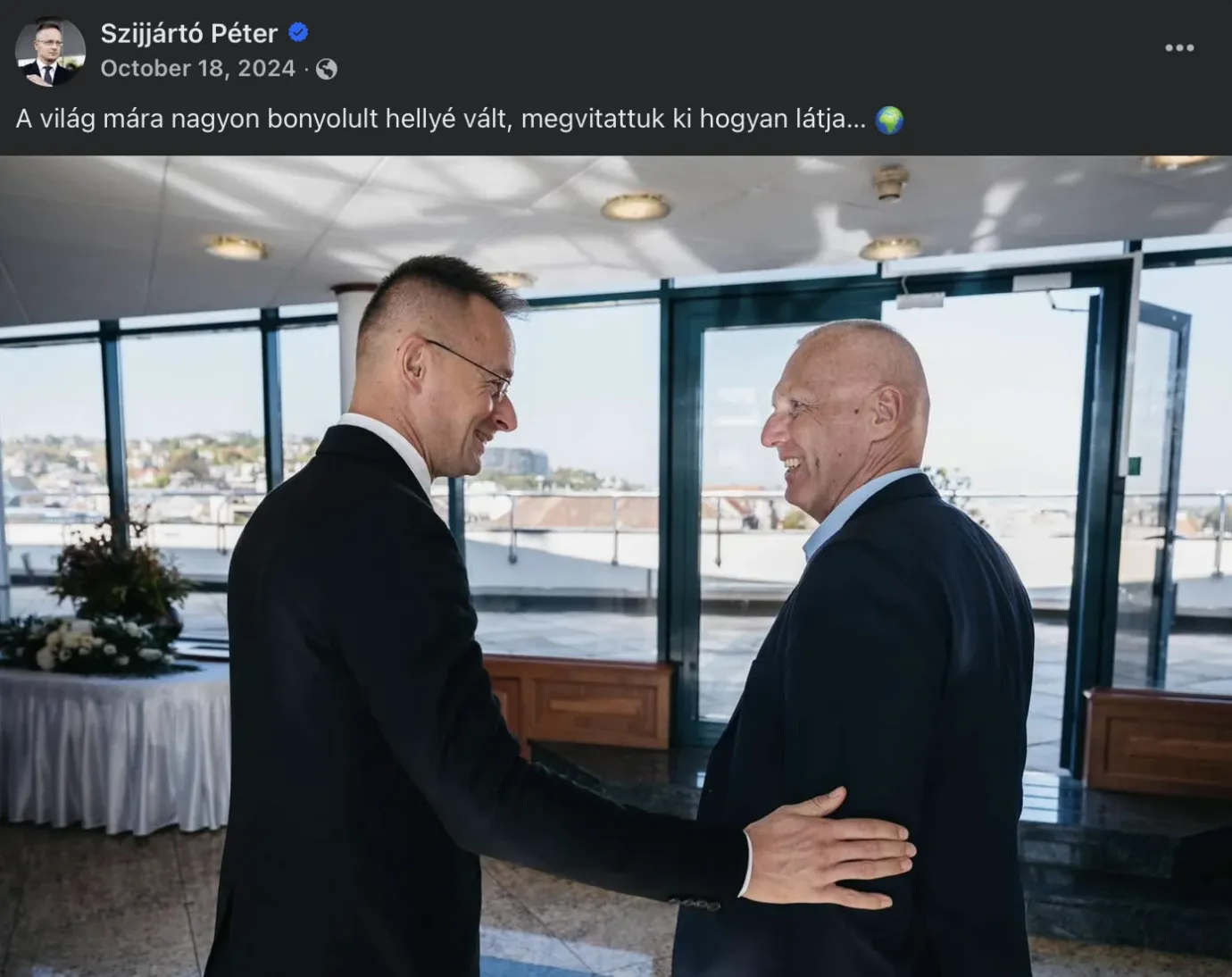
Szijjártó posted about Spöttle on his Facebook page.
According to sources familiar with the situation, Szijjártó was one of the high-ranking government officials whom Spöttle approached to lobby on behalf of his close acquaintance—trying to ensure their participation in the diplomatic training program despite the national security red flag.
The training course offered by the Hungarian Diplomatic Academy ran from September 1, 2024, to August 31, 2025. Participants received a net monthly stipend of €700 (275,000 forints), and the application process required candidates to consent to a national security screening. Spöttle’s acquaintance failed this screening, prompting Spöttle to begin lobbying behind the scenes—an effort even Szijjártó ultimately resisted.
In theory, the Ministry of Foreign Affairs and Trade should be among the most tightly secured institutions from a national security standpoint. Staff are re-screened every five years by the Constitution Protection Office (AH), while the ministry’s own Security, IT and Telecommunications Directorate (BITÁF) oversees secure communications and the handling of sensitive information. Hungarian foreign intelligence, the Information Office (IH) is responsible for protecting diplomats and embassies abroad.
But in the case of Spöttle’s acquaintance, the ministry could hardly ignore the situation—especially given that Spöttle himself had long been on the radar of Hungarian intelligence agencies. His ties extended far beyond Russian intelligence.
According to his own account, Spöttle first worked for German military counterintelligence, then later for the federal police. In a 2002 Magyar Nemzet interview titled “The Commando’s Soul,” he shared details about his military and police career in Germany, from which he was reportedly discharged on January 1, 2002. By then, he was already being introduced to the Hungarian public as a civilian “terrorism expert” and “analyst.”
He claimed he was drafted into the West German army at the age of 20, and that, after basic training, he specialized in “special weaponry,” including “anti-tank systems and various machine guns.” He said his interest in the Middle East and fluency in four languages led military counterintelligence to recruit him.
“Of course, I said yes—it seemed like a fascinating mission. I worked there for nearly ten years. After completing the police academy, I joined the Federal Investigation Bureau in 1993,”
Spöttle claimed. (A 2006 Magyar Nemzet article described him slightly differently—as “a former officer of the German riot police.”)
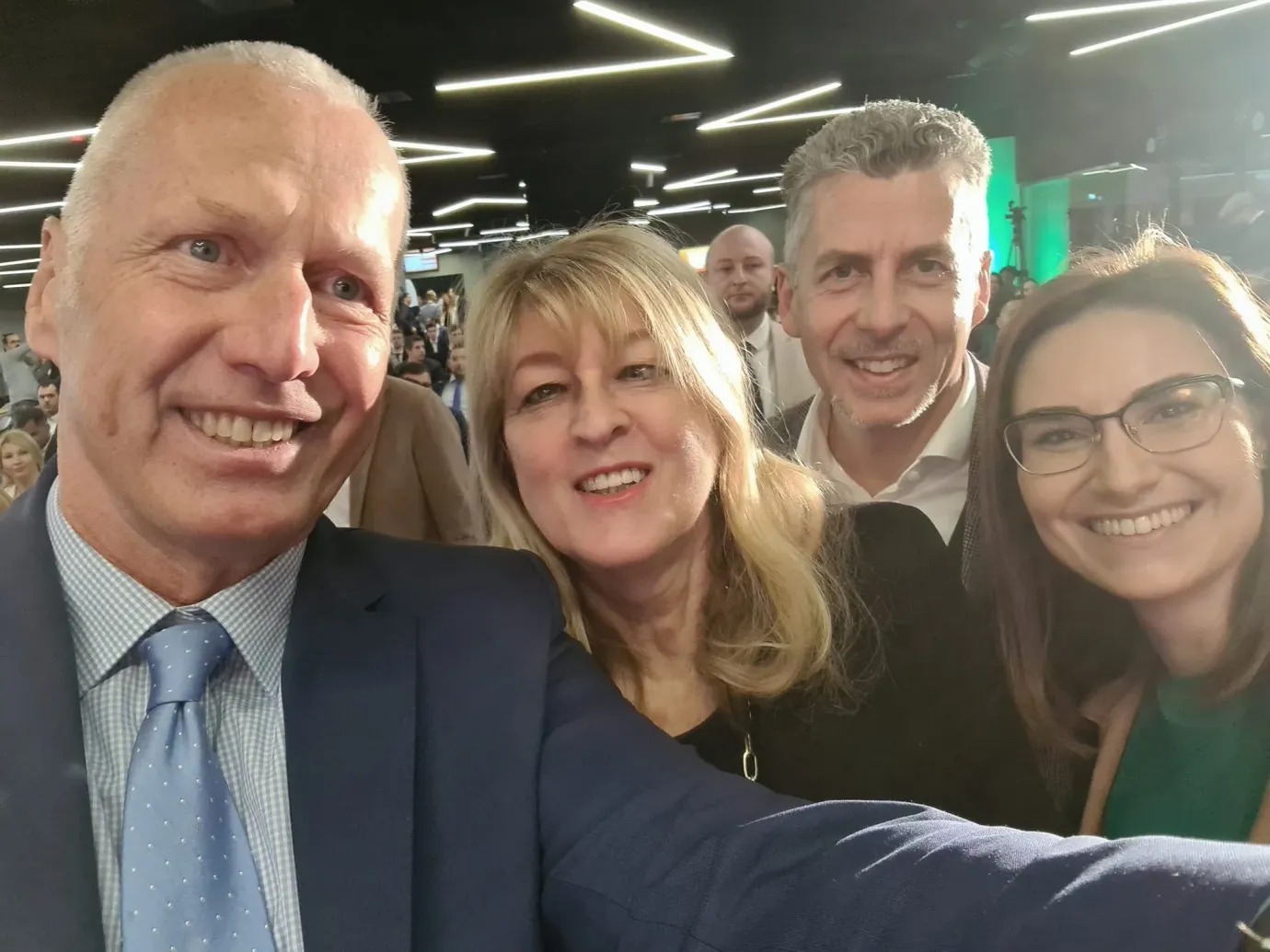
Spöttle is popular in Fidesz circles – Photo: Spöttle’s Facebook page.
According to his own version of events, he was initially assigned desk work: “My task was to screen asylum seekers from Arab countries for potential risks.” Later, while serving with the Bundeswehr, “I spent a lot of time in Lebanon, Iraq, Jordan, and Syria. Our job was surveillance and building contacts.” He also said that in the intelligence field, “the Israelis command the highest respect,” and that “Americans are admired for their technology.”
These comments are especially notable in light of accounts from several former Hungarian intelligence officers and national security experts who recalled an incident in the late 2000s: partner agencies from other countries alerted the Hungarian services that Spöttle had approached both the American and Israeli embassies in a European capital—offering to share his supposed expertise and contacts with their intelligence services. “In our profession, we call that ‘flipping over for a belly rub,’” said one former intelligence officer familiar with Spöttle’s case. Another source added,
“He craved recognition. And he always claimed he had no money—he was broke and constantly looking for sponsors.”
At the time, the now pro-Kremlin propagandist was reportedly trying to offer his alleged Middle Eastern network to the CIA and Mossad. But both the Americans and Israelis interpreted Spöttle’s approach as a provocation—and notified their Hungarian counterparts. This prompted Hungary’s intelligence services to conduct a deeper investigation into the former German policeman, revealing personal and lifestyle-related factors that led them to conclude he was unfit for any form of cooperation. One former officer said that, within Hungarian national security circles, Spöttle was viewed from the outset as unserious, unprofessional, and prone to conspiracy theories.
For example, in the 1990s, Spöttle spoke at UFO-themed events. According to reports from that time, he claimed he had been contacted and examined multiple times by extraterrestrial beings. “For weeks, I battled fear. At night I would sit on my bed with my service weapon, prepared to kill if the grey creatures came back,” Spöttle once recounted per a quote cited by 444.hu.
The favorite podcaster of Hungary’s foreign minister
In that Magyar Nemzet interview from over two decades ago, Spöttle expressed a starkly negative view of Russian intelligence. “We thought they were a very vile bunch. They were like a hammer—slamming down hard on anything suspicious. Their operations were bloody, practically signing every action with violence. We were all afraid of the KGB. No one wanted to fall into their hands, and nobody respected them,” he said in 2002.
Fast forward 20 years. After Russia invaded Ukraine in 2022, Spöttle became an open supporter of Russian aggression—voicing this support almost exclusively on government-affiliated, pro-Orbán platforms. He had first been picked up and promoted by pro-government propaganda outlets during the 2015 refugee crisis, initially as a “migration expert.” Over time, his commentary became increasingly focused on the Russia–Ukraine conflict.
According to emails seen by Direkt36 and sources familiar with the failed security screening of Spöttle’s acquaintance, Spöttle regularly receives talking points and narrative suggestions from Russian actors, some of whom are connected to Russian intelligence services.
On March 6, 2024, for example, Colonel Oleg Smirnov—the Russian military attaché at the Budapest embassy and a GRU intelligence officer—sent out two English-language propaganda memos to multiple recipients. These memos, marked with the Russian embassy’s letterhead, were titled “On the Role of Western Countries in the Ukrainian Conflict” and “Situation Around Ukraine.”
Using AI tools, we compared the content of these memos to Spöttle’s later public statements, and the analysis revealed a high level of textual and thematic overlap. The memos claimed that the war was provoked by the West; that Ukraine lacked autonomy and was being used as a pawn; that Zelensky was a puppet of the West; and that military aid merely prolonged Ukrainian suffering. Spöttle echoed nearly identical arguments in his own commentary.
There was complete alignment between the embassy documents and Spöttle’s assertions that Crimea and Donbas are irrevocably Russian territory, that Ukraine must relinquish them, and that peace could only be achieved through Ukrainian demilitarization and “denazification.” Both the Russian materials and Spöttle’s commentary also targeted NATO, framing it as a force driving military confrontation and threatening Russia. These narratives go far beyond even the Orbán government’s pro-Russian messaging.
Later, in an April 10, 2024 English-language email, Spöttle thanked Smirnov for enabling his participation in the Moscow International Security Conference, which was organized by the Russian Ministry of Defense on August 12–13, 2024. “I will do my best to give and get new impulses in the field of international politics and security and will publish the results on TV and newspapers in Hungary,” Spöttle wrote.
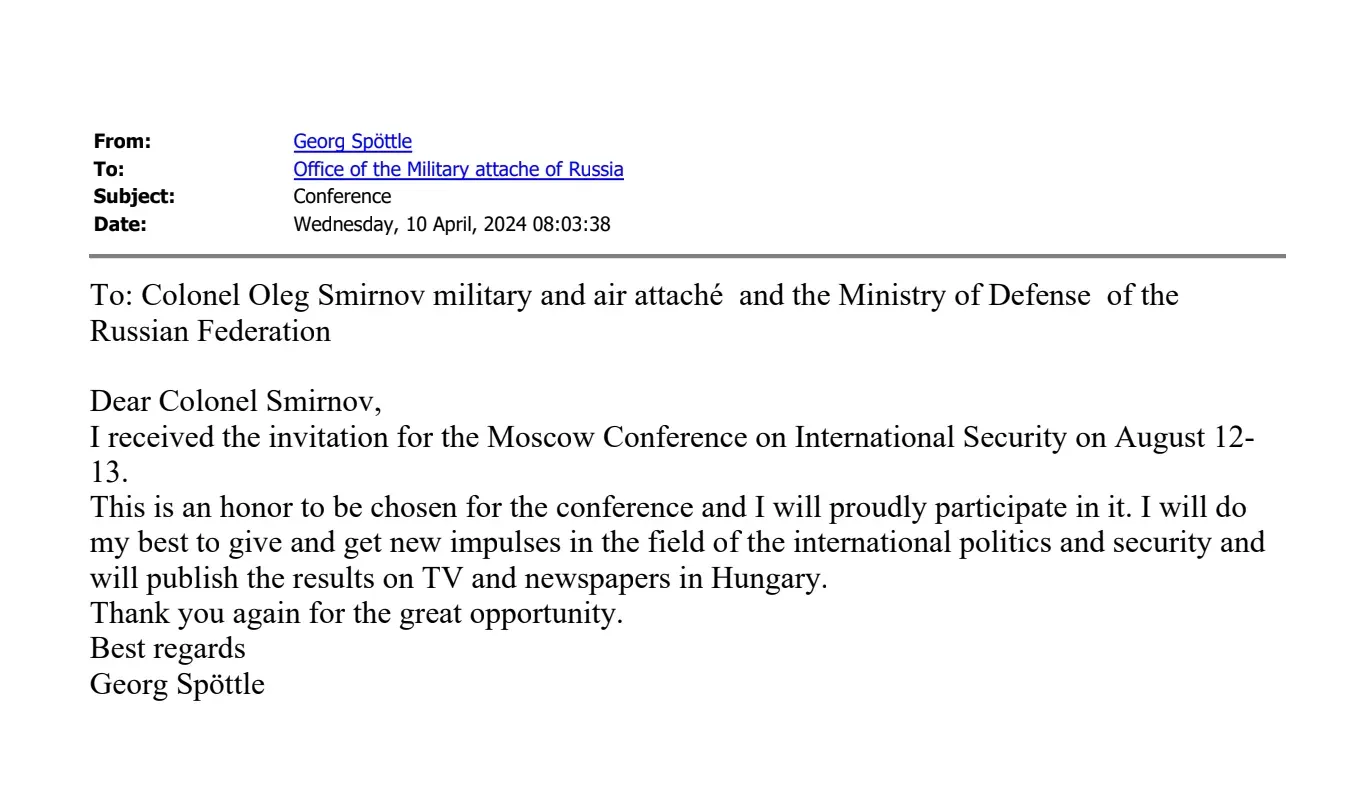
Spöttle’s grateful email to the Russian military attaché
Among the documents obtained by Direkt36 is a photo of Spöttle’s badge for the conference, labeled “Spottle Georg, Hungary, Delegate.” On both mornings of the event, Spöttle posted videos from his Moscow hotel room. He described meetings at the Russian Foreign Ministry—including with Rodion Mirosnyik, an advisor to Sergey Lavrov who is under EU sanctions—but curiously omitted any mention of the defense ministry’s conference, which Smirnov had helped him attend. According to a source familiar with the failed screening of Spöttle’s acquaintance, he may have deliberately hidden his participation due to the ongoing vetting process.
This secrecy stands in contrast to his behavior at the same conference in 2023, when he publicly shared his presence and even implied he gave a talk. “Naturally, my topic will be migration—how Hungary is successfully defending itself,” he said in a video at the time. He also praised the event:
“You gain new experiences, ideas, impulses—and, of course, new friends. All of that is very important.”
A photo posted that year showed him participating in a small expert discussion group.
Another document shows that both Spöttle and his diplomat trainee acquaintance were invited to Smirnov’s farewell reception in September 2024, marking the end of the Russian military attaché’s diplomatic posting. Direkt36 also obtained a selfie taken on the terrace of the Byblos Lebanese restaurant in Budapest, showing Smirnov and his wife seated with Spöttle.
According to our research into Russian online sources and databases, Colonel Oleg Alekseyevich Smirnov received armored unit training, studied at the Moscow State Technical University, and served between 2011 and 2021 as a military attaché in Prague before being posted to Hungary. A Czech government source confirmed that Smirnov was considered by their intelligence services to be a GRU officer. He moved from Prague to Budapest in September 2021 and quickly began attending events for foreign military attachés stationed in Hungary. It’s unclear when he first established contact with Spöttle.
What is clear is that, from the early days of the war in February 2022, Spöttle was spreading Kremlin disinformation. On Pesti Srácok, he blamed Ukrainian “Banderites” (ultranationalists) for killing civilians. He suggested that the Bucha massacre may have been committed by Ukrainians. He also promoted a conspiracy theory that the United States was operating secret biolabs in Ukraine to develop biological weapons against Russia. In a November 2022 Magyar Hírlap interview, Spöttle claimed that some Western military aid sent to Ukraine was being sold off by Ukrainians to criminal groups—including jihadist terrorists. That interview was later translated into Russian and published by a so-called “Z-blogger” (Russian online propagandists supporting the invasion).
Since the beginning of the full-scale invasion, Spöttle has become a regular presence not just on fringe outlets like Pesti Srácok, but on much larger government-affiliated platforms: Magyar Nemzet, state media, TV2’s morning show Mokka, Hír TV, the Ultrahang podcast affiliated with the Faith Church, and Origo, where he has his own column. He recently warned Origo readers that Ukraine’s EU accession would lead to “Ukrainian mafias” involved in prostitution, human trafficking, and drug smuggling appearing in Hungary—weeks before Viktor Orbán and the government adopted the same narrative.
His content is frequently highlighted by Mandiner, a publication owned by the government-funded Mathias Corvinus Collegium (MCC), which sometimes even recaps his appearances in Russian media.
An expert in Russia
Spöttle also features regularly in Kremlin-backed Russian propaganda. Analyses of these articles show that he is presented as a foreign expert who confirms and amplifies pro-Kremlin narratives for domestic Russian audiences. He is always labeled a vengerskiy (Hungarian) political analyst and often comments on not just Hungarian matters but broader international topics. He’s weighed in for RIA Novosti on the Tucker Carlson–Putin interview, the formation of the Patriots for Europe alliance (multiple times), and, in February 2024, the German elections and German–Russian relations.
He also promotes clips from his video interviews on his own TikTok account, which has 22,000 followers and 330,000 likes. A European investigative project (with Átlátszó’s involvement) published in summer 2024—focusing on far-right and pro-Russian disinformation on TikTok—identified Spöttle as one of the main spreaders of such conspiracy content in the Hungarian-language TikTok sphere.
Meanwhile, Spöttle has made multiple visits to Russia and even to Russian-occupied Ukrainian territories. He has reported extensively on these trips through Hungarian pro-government media and on his Facebook page, sharing updates from every location. In August 2023, in addition to attending the Moscow conference, he visited occupied Mariupol, posting about “Nazi Ukrainians attacking civilians” and posing for photos with schoolgirls. On the Ultrahang podcast, he broadcast a “heart-wrenching report” on Ukraine’s alleged crimes from Donbas.
When he returned to Russia in August 2024, Spöttle also visited Chechnya and Grozny, including V.V. Putin Russian Spetsnaz University, where he posed for photos at the shooting range among weapons and armed men. The university was founded in 2013 by Chechen leader Ramzan Kadyrov in Gudermes under its original name, the International Special Forces Training Center. It was later renamed after Vladimir Putin. In April 2024, Kadyrov appointed his 16-year-old son Adam Kadyrov as chairman of the university’s board. Since the war began, the university has been training volunteers for front-line deployment.
Multiple former intelligence officers and sources familiar with Spöttle’s case told Direkt36 that no EU or NATO citizen would be able to access such places during wartime without the active cooperation or approval of the GRU or Russia’s Federal Security Service (FSB).
Despite this, Spöttle’s social media posts show that he routinely meets with senior Fidesz politicians and shares selfies from studios and events—including with the likes of Viktor Orbán himself, from whom (according to another post) he once received a birthday card. He’s appeared at countless government-aligned events, from the annual Băile Tușnad (Tusnádfürdő) gathering in Romania to CPAC Hungary. At CPAC 2023, he even posed for a photo with Defense Minister Kristóf Szalay-Bobrovniczky, who oversees the Military National Security Service (KNBSZ), the very agency tasked with countering GRU espionage in Hungary.
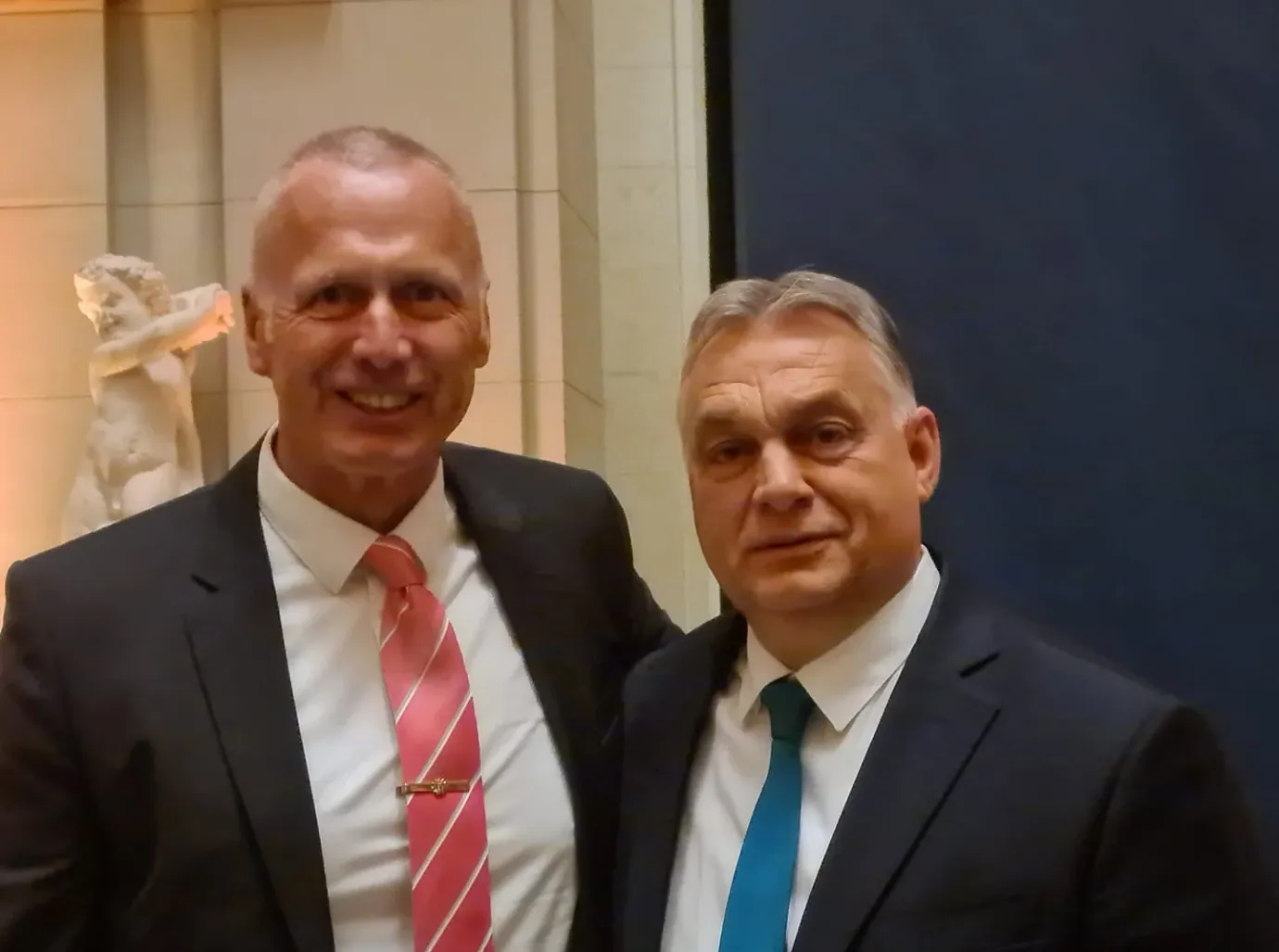
Spöttle with Viktor Orbán – Source: Spöttle’s Facebook page
And it seems Spöttle’s Russian propaganda in Hungarian media is having an impact. In March 2025, Foreign Minister Szijjártó publicly stated that while working out, he always listens to podcasts by Georg Spöttle and György Nógrádi (another government-linked “security expert”):
“I listen to Georg to hear what’s going on in geopolitics—it’s the perfect length for my run. So I’d like to congratulate him on the show. I really, really like it,” Szijjártó said.
Hungary’s foreign minister made this comment just months after his own ministry’s security screening had flagged Spöttle’s ties to Russian intelligence.
Nikita Hava contributed to this article.
This article was originally published on Direkt36.
Subscribe to “Goulash”, our newsletter with original scoops and the best investigative journalism from Central Europe, written by Szabolcs Panyi. Get it in your inbox every second Thursday!
VSquare’s Budapest-based lead investigative editor in charge of Central European investigations, Szabolcs Panyi is also a Hungarian investigative journalist at Direkt36. He covers national security, foreign policy, and Russian and Chinese influence. He was a European Press Prize finalist in 2018 and 2021.

